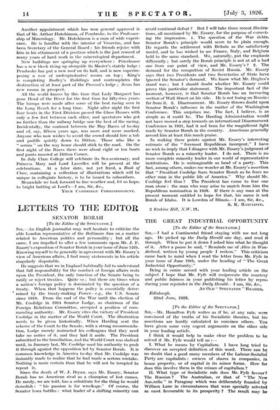LETTERS TO THE EDITOR
SENATOR BORAH [To the Editor of the SPECTATOR.] Sit,—An English journalist may well hesitate to criticize the able London representative of the Baltimore Sun on a matter related to American politics and personality ; but all the same, I am impelled to offer a few comments upon Mr. J. F. Essary's exposition of Senator Borah in your issue of June 12th. Knowing myself to be generally in agreement with Mr. Essary's view of American affairs, I find many statements in his article singularly disputable.
He suggests that we in England habitually fail to understand that full. responsibility for the conduct ot foreign affairs rests upon the President, the only function of the Senate being to ratify or reject treaties. Quite so ; but there are times when a nation's foreign policy is dominated by the question of a treaty. When that happens the policy is essentially deter- mined by the treaty-making Power—e.g., the U.S. Senate since 1919. From the end of the War until the election of Mr. Coolidge in 1924 Senator Lodge, as chairman of the Foreign Relations Committee, occupied a position of com- manding authority. Mr. Essary cites the victory of President Coolidge in the matter of the World Court. The illustration needs to be given historically. When Harding sent the scheme of the Court to the Senate, with a strong recommenda- tion, Lodge merely instructed his colleagues that they need take no notice of it, and they laid it aside. The President submitted to the humiliation, and the World Court was shelved until, in January last, Mr. Coolidge used his authority to push it through against the opposition led by Senator Borah. It is common knowledge in America to-day that Mr. Coolidge was instantly made to realize that he had made a serious mistake. Nothing is more certain than that he will not be tempted to repeat it.
Since the death of W. J. Bryan, says Mr. Essary, Senator Borah has no American rival as a champion of lost causes. He rarely, we are told, has a substitute for the thing he would. demolish : "his passion is for wreckage." Of course, the Senator loses battles : what leader of a shifting minority can
avoid continual defeat ? But I will take three recent illustra- tions, all mentioned by Mr. Essary, for the purpose of correct- ing the impression. 1. The question of the War debts. Senator Borah's principle would seem to be plain enough. He regards the settlement with Britain as the satisfactory model, and he has wished to see France, Italy, and Belgium held to the same standard. We, naturally, put the emphasis differently ; but surely the Borah principle is not at all a bad one from our point of view, and Mr. Essary's ? 2. The demand for the recognition of Soviet Russia. Mr. Essary says that two Presidents and two Secretaries of State have ignored the Senator's demand. We know what Mr. Hughes's stand was ; but I should doubt whether Mr. Essary could prove this particular statement. The important fact of the moment, however, is that Senator Borah has an increasing section of Wall Street on his side. He is not losing on Russia : far from it. 3. Disarmament. Mr. Essary throws doubt upon Senator Borah's influence in the matter of the Washington Conference. This surprises me. The fact, I believe, is as simple as it could be. The Harding Administration would not have moved a step towards an international Disarmament Conference in 1921, had it not been for the magnificent fight made by Senator Borah in the country. Americans generally accord him at least this much praise.
In making these points against Mr. Essary's interesting estimate of the "foremost Republican insurgent," I have no wish to imply that I disagree with Mr. Essary's judgment of Senator Borah as a minority leader. I do not. There is no more complete minority leader in our world of representative institutions. He is unimaginable as head of a party. This fact, among others, makes me wonder at Mr. Essary's assertion that "President Coolidge fears Senator Borah as he fears no other man in the public life of America." Why should Mr. Coolidge feel thus ? The President has cause to fear one man alone : the man who may arise to snatch from him the Republican nomination in 1928. If there is any man at the present moment entitled to hope for that, his name is not Borah of Idaho. It is Lowden of Illinois.—I am, Sir, &c.,
2 Erskine Hill, NM'. 11. S. K. RATCLIFFE.










































 Previous page
Previous page